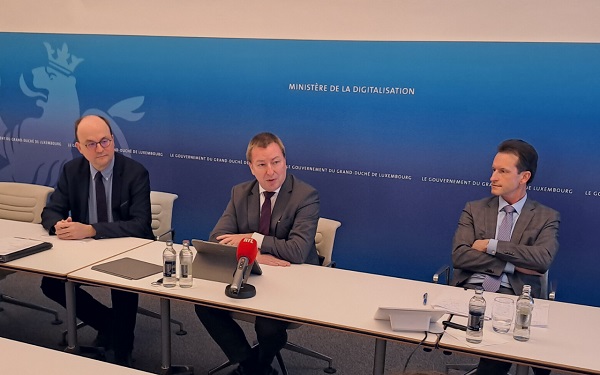 (L-R) Tom Wirion, Director General of Chamber of Skilled Trades & Crafts; Marc Hansen, Luxembourg's Minister Delegate for Digitalisation; Carlo Thelen, Director General of Luxembourg Chamber of Commerce;
Credit: MinDigital
(L-R) Tom Wirion, Director General of Chamber of Skilled Trades & Crafts; Marc Hansen, Luxembourg's Minister Delegate for Digitalisation; Carlo Thelen, Director General of Luxembourg Chamber of Commerce;
Credit: MinDigital
On Saturday 18 March 2023, electronic invoicing will become mandatory for all invoices sent by businesses and organisations to a public sector body in Luxembourg.
On Monday 27 February 2023, ahead of the final phase of the law on mandatory e-invoicing, Luxembourg's Minister Delegate for Digitalisation, Marc Hansen, the Director General of the Luxembourg Chamber of Commerce, Carlo Thelen, and the Director General of the Chamber of Skilled Trades and Crafts (Chambre des Métiers), Tom Wirion, revisited the key points relating to e-invoicing, which will be obligatory for all invoices (regardless of their amount) sent by any business or organisation (whether Luxembourgish or non-Luxembourgish) to the Luxembourg State.
Firstly, Minister Delegate Marc Hansen specified that e-invoicing should not be confused with invoices sent in PDF format or by email; e-invoicing encompasses an invoice established according to a standardised format, the fields of which can be read and interpreted automatically by a computer. Consequently, this may require adaptations of companies' internal (and IT) processes.
The advantages of such an approach are multiple, according to the Ministry for Digitalisation, because process automation is believed to generate increased speed and efficiency in the processing of these invoices, a reduction in costs, an acceleration of payment times and better traceability of invoices, among other things.
The Minister Delegate also insisted on the main objective of this obligation which was legally introduced in December 2021 and has been staggered over time: to contribute to increasing the competitiveness of the private sector by improving the productivity of companies and therefore increasing the competitiveness of the Luxembourg economy as a whole.
Small businesses are particularly concerned by the date of 18 March 2023. To support them in this digital transition, a technical solution for e-invoicing is available on MyGuichet.lu. This has been specially set up for companies that do not have a suitable IT structure or that are only rarely required to send an invoice to the public sector. The process of issuing and transmitting electronic invoices via MyGuichet.lu is also possible on the MyGuichet.lu application.
Since the entry into force of the 2021 law, the Ministry for Digitalisation, the Luxembourg Chamber of Commerce and the Chamber of Skilled Trades and Crafts have increased communication to better prepare companies for this obligation. This collaboration has taken the form of various conferences, webinars, training programmes, letters and emails to companies, explanatory videos, tutorials and the launch of a dedicated portal: www.e-facturation.lu.
Minister Delegate Hansen noted that efforts to inform and support businesses will go beyond 18 March: "The helpdesks of the various partners will continue to be active in answering questions from all companies."
Considering the advantages of e-invoicing and beyond "B2G" (business to government), Carlo Thelen recommended the switch to e-invoicing also for companies' "B2B" (business to business) relationships. He spoke about how digitalisation in general represents a growth potential for companies, including SMEs, and recalled that the House of Entrepreneurship of the Luxembourg Chamber of Commerce is available to support entrepreneurs in their digital transition.
Tom Wirion welcomed the many good exchanges between the Ministry of Digitalisation and the professional chambers, aimed at quickly implementing e-invoicing within the national ecosystem in the most flexible way. He noted that the advantages of e-invoicing are multiple for the craft sector, for example by reducing invoice payment times, improving traceability and reducing manual entries. With its eHandwierk service, the Chamber of Trades is working alongside craft businesses to guide them in their digital transformation.








